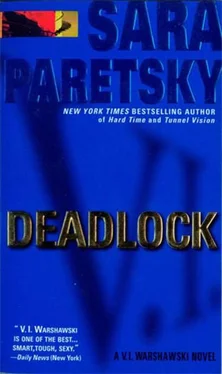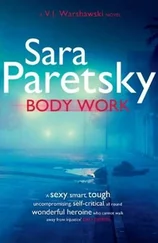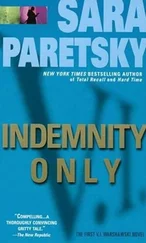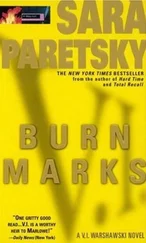“The thing is,” Ferrant said confidentially in his English accent, “it’s just cheering to know there may really be a villain out there.”
“Yeah,” I said as we came out in the deserted lobby, “but what if you find he works for another one of your insureds?”
“You mustn’t say things like that,” Ferrant said. “You really mustn’t. I feel like eating for the first time since I heard about the Lucella last Saturday morning. I don’t want you to ruin my dinner with horrible suggestions.”
Hogarth departed for the Northwestern Station and a train to Schaumburg. Ferrant was staying in Scupperfield, Plouder’s apartment in the Hancock Building. I offered him a ride up in my Omega, which was parked in an underground garage nearby.
Before starting it I checked under the hood, looked at the oil, the brake fluid, the radiator. When Ferrant asked what I was doing I explained that I’d been in an accident recently and it made me more cautious about my car. Nothing seemed to be wrong.
On the short trip up Michigan Avenue to the Hancock I asked him if Scupperfield, Plouder had also underwritten the hull damage to the Leif Ericsson . They had; they underwrote all of the Grafalk Line.
“That’s how Bledsoe came to us-he knew us from working with Grafalk.
“I see.” I asked for his opinion of Bledsoe.
“One of the smartest men in the industry today. It’s not a good time to be in Great Lakes shipping, at least not for U.S. carriers. Your government gives considerable advantages to foreign flagships they don’t accord to U.S. vessels. Furthermore, old firms like Grafalk have some special legal positions that make it hard for a newcomer to break into the business. But Bledsoe can do it if anyone can. I just hope the wreck of the Lucella doesn’t put an end to Pole Star.”
He invited me to dine with him, but I thought I’d better get to the police with my news about Mattingly. I’d told my tale to Bledsoe, and now to the insurance people. Although I hadn’t given Murray Ryerson the name of the man with binoculars I’d seen at the Soo, he was no dummy-he might easily tie it in with my interest in Mattingly. Bobby Mallory was not going to look at me kindly if he read the story first in the Herald-Star .
I felt uneasy as I moved my car onto Lake Shore Drive. My life had been threatened two weeks ago. Phillips was dead, possibly because of the veiled threat I’d left with his son Saturday night. Perhaps he’d panicked, threatened to reveal what he knew, and been killed for his pains. Mattingly was dead, probably to keep him from boasting in the locker room that he’d blown up a ship. Boom Boom was dead because he knew that Phillips was fiddling grain invoices. Why was I still driving around? Maybe they thought more people would be killed when the Lucella went up. They might have been relying on that to get rid of me and be thinking up some other accident for me now. Or maybe they just didn’t believe I knew anything important.
I tried comforting myself with that idea the rest of the way home, but I had known even less when my car was sabotaged ten days ago. It occurred to me as I exited at Belmont that the deaths in this case had been staged as a species of accident: Boom Boom had fallen overboard, Mattingly had been hit by a car, Phillips crushed in a self-unloader. If my car had killed me as it was supposed to, I don’t suppose anyone would have gone to great pains to find that the steering control was sabotaged.
I hadn’t been able to convince the police that there might be a connection between the night watchman’s death and Boom Boom’s. They wanted to treat the threat on me as a routine act of vandalism. In other words, the murderer had gauged the psychology of the situation accurately. Now that I was prepared to divulge what I knew about Mattingly, how likely were the police to tie that in with Kelvin and Boom Boom? Not terribly.
I was half tempted to keep the news to myself. But the police have a good machinery for sifting through large crowds of witnesses. If they did follow up on my information, they could find out who picked Mattingly up at Meigs last Friday far more readily than I.
As I parked the car, carefully selecting a spot in front of a restaurant so that would-be attackers would face a maximum of witnesses, I decided I’d keep the story of Mattingly and the binoculars to myself. Just say that he’d flown back in Bledsoe’s plane.

When I got to my apartment, I saw I was going to have to choose a story quickly. Sergeant McGonnigal was waiting for me in an unmarked brown Dodge. He got out when he saw me walking up the steps to the front door.
“Good evening, Miss Warshawski. Would you mind coming downtown with me? Lieutenant Mallory wants to ask you some questions.”
“What about?” I asked, taking out my keys and putting them in the front door.
McGonnigal shook his head. “I don’t know-he just asked me to bring you down.”
“Lieutenant Mallory thinks I should be living in Melrose Park with a husband and six children. I suspect any questions he wants to ask me have to do with how close I am to reaching that goal. Tell him to send me a Christmas card.” Just because I’d been going to see the police voluntarily didn’t mean I had to like it when they came to fetch me.
McGonnigal set his handsome mouth in a thin line. in as a material witness. Because Lieutenant Mallory was a friend of your father’s he wants you to come of your own free will to answer some questions.”
I was going to have to start wearing gloves if I ever wanted to make it as a burglar. “Very well. I’m coming of my own free will.” I opened the front door. “I need to get something to eat first. Want to come up with me to make sure I don’t swallow a cyanide tablet?”
McGonnigal made an angry gesture and told me he’d wait in the car. I ran quickly up the three flights to my apartment. The larder was still bare-I hadn’t had time to go to the store yet. I settled for a peanut butter sandwich made with the last two pieces of bread in the refrigerator and coffee reheated from breakfast. While I ate, I took Boom Boom’s documents and taped them inside a couple of old copies of Fortune .
I went into the bathroom and brushed my teeth and washed my face. I need to feel fresh and alert for a conversation with Bobby. I ran lightly back down the stairs to McGonnigal’s waiting car. My shoulder gave me only faint twinges. I realized gloomily that I could start jogging again in the morning.
McGonnigal had the engine running. He took off with an ostentatious squeal of rubber before I even closed the door all the way. I put on the seat belt. “You ought to wear yours if you’re going to drive like that,” I told him. “Insurance people and police-the two groups who see the most car accidents and the two you never see with seat belts.”
McGonnigal didn’t answer. In fact conversation flagged all the way downtown. I tried to interest him in the Cubs’ chances with Lee Elia and Dallas Green at the helm. He didn’t want to talk about it. “I hope you’re not a Yankee fan, Sergeant. If you are, you’re going to have to arrest me to get me into the same car with you.”
His only response was to drive faster. I kept up a monologue on the perfidies of the Yankees until we got to Twelfth Street, forbearing to comment on the fact that he was driving too fast for normal road conditions. He parked the car two feet from the curb and swung himself out, slamming the door behind him. I followed him into the back door of the Twelfth Street station.
“By the way, Sergeant, did you ever find anyone in the Kelvin murder?”
Читать дальше













